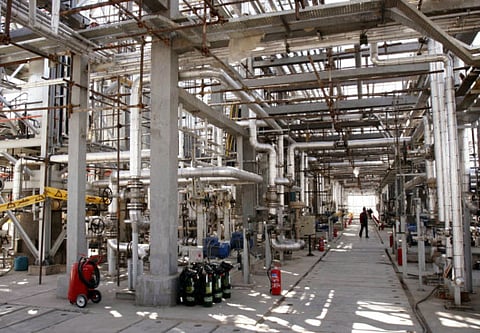Iran says it’s no longer abiding by uranium enrichment limits
Decision comes after Trump pulled U.S. out of 2015 accord

Highlights
- Nuclear deal mothballed three-quarters of enrichment capacity
- Now, Iran is saying limits imposed by the nuclear accord with world powers on its uranium enrichment and centrifuge research no longer applies to it
- The move by Tehran throwing down a new challenge to European leaders struggling to sustain their diplomatic push to calm the Gulf
The Islamic Republic will forge ahead with plans to develop its advanced centrifuges and has started injecting them with gas, Behrouz Kamalvandi, spokesman for the Atomic Energy Organization of Iran, said on Saturday in a press conference — a breach of a time-frame agreed for the measure within the 2015 deal.
He said that while Iran will “set aside” restrictions on uranium enrichment it has no need as yet to enrich uranium beyond 20%, a level halted by the nuclear accord and required for research reactors.
Weapons-grade uranium needs to have an enrichment level of 90% or more.
Injecting advanced “IR-6” centrifuges — a chain of 20 of which Iran installed in April — with gas is a step Iran is allowed to take 11 years into the implementation of the nuclear deal, according to its terms, Kamalvandi said.
Centrifuges are fast-spinning machines used to enrich uranium, and the latest statement by Iran is likely to trigger claims by its foes in Washington and the Middle East that the Islamic Republic is intent on rebuilding an atomic program capable of producing nuclear weapons.
Kamalvandi said that while its latest actions may amount to Iran ceasing compliance to technical aspects of the accord, they were “reversible within a day” and the agreement itself remained intact.
Iran will not take any action against international nuclear inspections or the work of the UN’s nuclear watchdog, Kamalvandi said, adding that foreign minister Mohammad Javad Zarif and the head of Iran’s atomic organization, Ali Akbar Salehi, will meet with the acting Director General of the IAEA, Cornel Feruta, on Sunday.
“Our decisions have been rational, firm and calculated. We’re moving forward in a steadfast and calculated manner and our counterparts know this,” Kamalvandi said, adding that new centrifuges will not be installed at its Fordow uranium enrichment plant.
“The EU said it would fulfill its commitments under the nuclear deal and it’s supposed to live up to that. This is meant to make them think. If they refer to their conscience they will realize that the Islamic Republic has made good on all of its obligations and it’s they who haven’t fulfilled all their commitments and it’s they who need to take action,” he said.
Iran has been scaling back its compliance to the terms of the beleaguered deal since May as it pushes back against the “maximum pressure” offensive of U.S. President Donald Trump, who unilaterally left the accord last year.
U.S. sanctions have targeted Iran’s vital oil exports and a French proposal orchestrated by President Emmanuel Macron to deliver the economic benefits demanded by Iran, and in turn salvage the deal, includes a $15 billion credit line against which Tehran can sell crude.
But the plan would require Trump, who is trying to wipe out Iran’s oil revenue, to approve sanctions waivers — an idea his advisers have so far dismissed. Rather than easing up, the U.S. is adding new sanctions.



